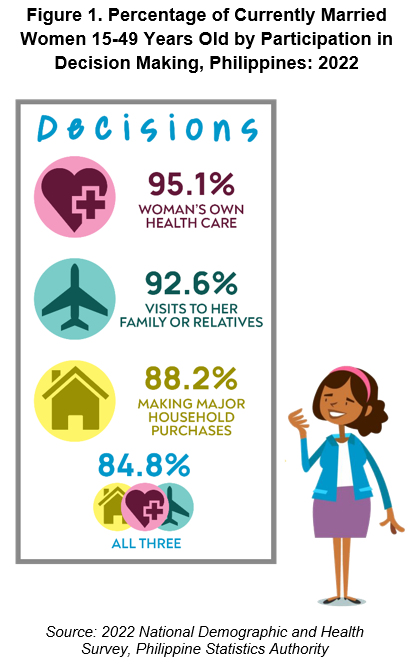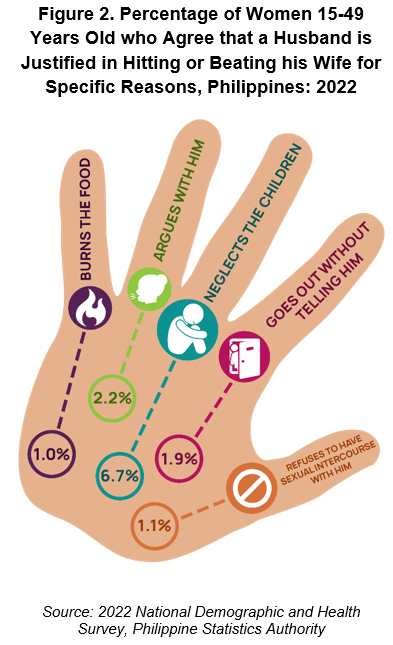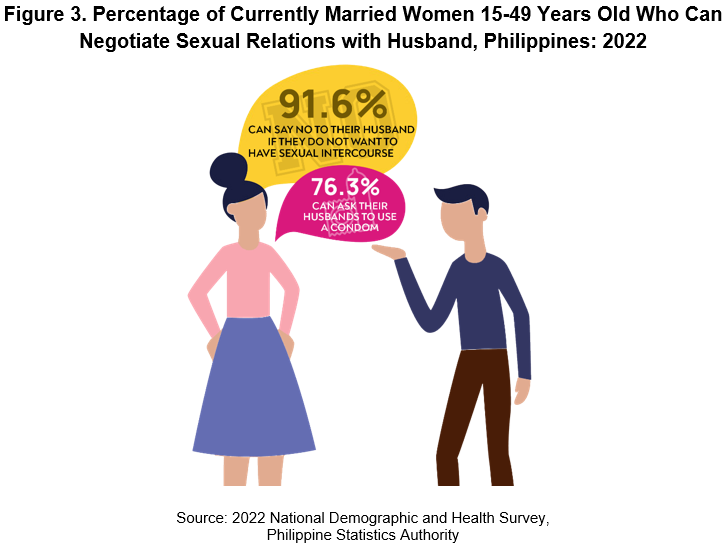The 2022 Philippines National Demographic and Health Survey (NDHS) is the seventh Demographic and Health Survey (DHS) conducted in the Philippines in collaboration with the worldwide DHS Program and the 12th in a series of national DHS surveys conducted every five years since 1968. The primary objective of the 2022 NDHS is to provide up-to-date estimates of basic demographic and health indicators. Specifically, the NDHS collected information on fertility, fertility preferences, family planning practices, childhood mortality, maternal and child health, nutrition, knowledge and attitudes regarding HIV/AIDS, violence against women, child discipline, early childhood development, and other health issues.
This Special Release explores women’s empowerment in terms of women’s participation in household decision making, women’s attitudes towards wife beating, and women’s participation in decision making regarding sexual and reproductive health.
Married women are most involved in making decisions about own health care.
Women are considered to participate in household decisions if they make decisions alone or jointly with their husband in the following aspects: (1) their own health care; (2) major household purchases; and (3) visits to their family or relatives. Eighty-five percent of currently married women aged 15-49 in the Philippines participate in all three of the specified household decisions, either alone or jointly with their husbands.
Moreover, women are more likely to decide on matters regarding their own health care (95.1%) and visits to their family or relatives (92.6%) than in decisions about making major household purchases (88.2%). On the other hand, three in 100 of currently married women do not participate in any of the three decisions.

Across regions, Cordillera Administrative Region (CAR) recorded the most married women aged 15 to 49 who participated in all three specified decisions, either by themselves or jointly with their husband, with 91.9 percent. This was closely followed by Central Luzon with 90.6 percent, and Ilocos Region with 89.4 percent. This pattern was also observed in decisions regarding major household purchases. CAR (94.7%), Ilocos Region (93.6%), and Central Luzon (92.8%) had the most married women who were involved in determining which household acquisitions must be made.
Women’s involvement in decisions regarding their own health care was highest in Eastern Visayas with 98.8 percent. In addition, majority of married women in Davao Region (98.6%) and Ilocos Region (98.0%) also had a say in matters involving their own health.
Another specific decision included in the 2022 NDHS to gauge women’s participation in decision making was visits to family or relatives. In 2022, married women from Ilocos Region were the most engaged in planning trips to visit their loved ones with 96.6 percent. This was followed by wives from CAR with 95.7 percent and Central Luzon with 95.9 percent.
Wife beating is justifiable under certain circumstances, some women say.
In 2022, a minority of women agreed that a husband hitting or beating his wife is reasonable if she: neglects the children (6.7%); argues with him (2.2%); goes out without telling him (1.9%); refuses to have sexual intercourse with him (1.1%); and burns the food (1.0%). Further, 1 in 10 married Filipinas concurred with at least one of the specified reasons above. The percentage of women who agree with at least one reason justifying wife hitting or beating has generally declined through time, from 24 percent in 2003 to 13 percent in 2013, and 9 percent in 2022.
Further, tolerance of wife beating under at least one justifiable instance was more apparent in women from Zamboanga Peninsula (15.1%), CAR (13.0%), and Central Luzon (12.0%). On the other hand, regions with the least percentage of women complaisant with a husband hitting his wife include CALABARZON with 6.1 percent, Western Visayas with 6.5 percent, and National Capital Region with 6.8 percent.
In CAR, 10.3 percent of women thought that wife hitting or beating is justified when she neglects the children. This was followed by instances such as when the wife argues with her husband (3.4%), and when she goes out without telling her husband (1.8%).

Generally, attitudes rationalizing wife beating exhibit an indirect relationship with educational attainment. This means that as women achieve higher levels of education, they tend to invalidate reasons justifying physical domestic violence against women. The same relationship was observed between attitudes justifying wife beating and household wealth.
Filipina wives are able to negotiate sexual relations with husband.
Nine in ten currently married Filipinas can say no to their husbands if they do not want to have sexual intercourse. Moreover, over 75 percent of Filipina wives can ask their husbands to use a condom in 2022.
At the regional level, percentage of wives who can refuse to have sexual intercourse with their respective husbands ranged from 59.6 percent in BARMM to 97.7 percent in Cagayan Valley. On the other hand, the share of women who can ask their husband to use a condom ranged from 46.8 percent in BARMM to 86.6 percent in Western Visayas.
Almost 90 percent of Cordilleran wives can decline their husbands when in comes to sexual relations. In addition, 8 in 10 wives from the region can ask their husbands to use a condom when engaging in sexual activities in 2022.

In 2022, 82.3 percent of currently married women aged 15 to 49 made their own informed decisions regarding sexual relations, contraceptive use, and reproductive health care in the Philippines. Across regions, this situation was relatively more apparent in Cagayan Valley with 88.1 percent, Central Luzon with 87.6 percent, and Eastern Visayas with 87.5 percent.
(SGD)
VILLAFE P. ALIBUYOG
Regional Director
_____________________________________
TECHNICAL NOTES
Participation in major household decisions
Women are considered to participate in household decisions if they make decisions alone or jointly with their husband in all three of the following areas: (1) their own health care; (2) major household purchases; and (3) visits to their family or relatives.
Attitudes towards wife beating
Respondents are asked if they agree that a husband is justified in hitting or beating his wife under each of the following five circumstances: she burns the food, she argues with him, she goes out without telling him, she neglects the children, and she refuses to have sex with him. If respondents answer “yes” in at least one circumstance, they are considered to have attitudes justifying wife beating.
Informed decision making on sexual relations, contraceptive use, and reproductive health
Women are considered to make their own informed decisions on sexual relations, contraceptive use, and reproductive health if (1) they can say no to their husband if they do not want to have sexual intercourse, (2) they make decisions about use of family planning alone or jointly with their husband, and (3) they make decisions about their own health care alone or jointly with their husband.



